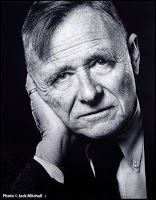Leo A single man (1964) de Christopher Isherwood. La novela narra un día en la vida de George, alter ego del autor: cincuenta y ocho años, inglés, homosexual, profesor de Literatura en una universidad de Los Ángeles. George acaba de sufrir la pérdida en un accidente de su pareja, Jim, y ahora debe enfrentar la vida solo: se levanta, va a dar clase, convive con los estudiantes y sus colegas, visita a una compañera y antigua rival que agoniza en el hospital, va al súper y al gimnasio, cena y se emborracha con una vieja amiga que vive atrapada en el pasado y finalmente intenta –infructuosamente– ligarse a un equívoco estudiante encontrado en un bar. No una gran novela, seguramente, pero sí una pequeña obra maestra en tono menor. Isherwood tenía buenas dotes introspectivas y narrativas. Es notable, por ejemplo, la conciencia del cuerpo del protagonista, su lúcida percepción del inexorable paso del tiempo:
Here’s what it has done to itself, here’s the mess it has somehow managed to get itself into, during its fifty-eight years; expressed in terms of a dull harassed stare, a coarsened nose, a mouth dragged down by the corners into a grimace as if at the sourness of its own toxins, cheeks sagging from their anchors of muscle, a throat hanging limp in tiny wrinkled folds. The harassed look is that of a desperately tired swimmer or runner; yet there is no question of stopping. The creature we are watching will struggle on and on until it drops. Not because it is heroic. It can imagine no alternative.
Más notable aún, su descripción de la vida académica, de la enseñanza y la relación profesor-alumnos, de la que George extrae su fuerza. Sabe, como todo verdadero maestro, que el salón es un teatro y el maestro una suerte de actor:
Meanwhile, he stands there. Slowly, deliberately, like a magician, he takes a single book out of his briefcase and places it on the reading-desk. As he does this, his eyes move over the faces of the class. His lips curve in a faint but bold smile. Some of them smile at him. George finds this frank confrontation extraordinarily exhilarating. He draws strength from these smiles, these bright young eyes. For him, this is one of the peak moments of the day. He feels brilliant, vital, challenging, slightly mysterious and, above all, foreign.
El final, en el que este modesto Sócrates se enfrenta a un provocador Alcibíades, deja al descubierto, conjuntamente, la fragilidad y la sabiduría del maestro:
Let me tell you something, Kenny. For other people, I can’t speak – but, personally, I haven’t gotten wise on anything. Certainly, I’ve been through this and that; and when it happens again, I say to myself, here it is again. But that doesn’t seem to help me. In my opinion, I personally have gotten steadily sillier and sillier and sillier – and that’s a fact. […] You asked about experience. So I told you. Experience isn’t any use. And yet, in quite another way, it might be. If only we weren’t all such miserable fools and prudes and cowards.
